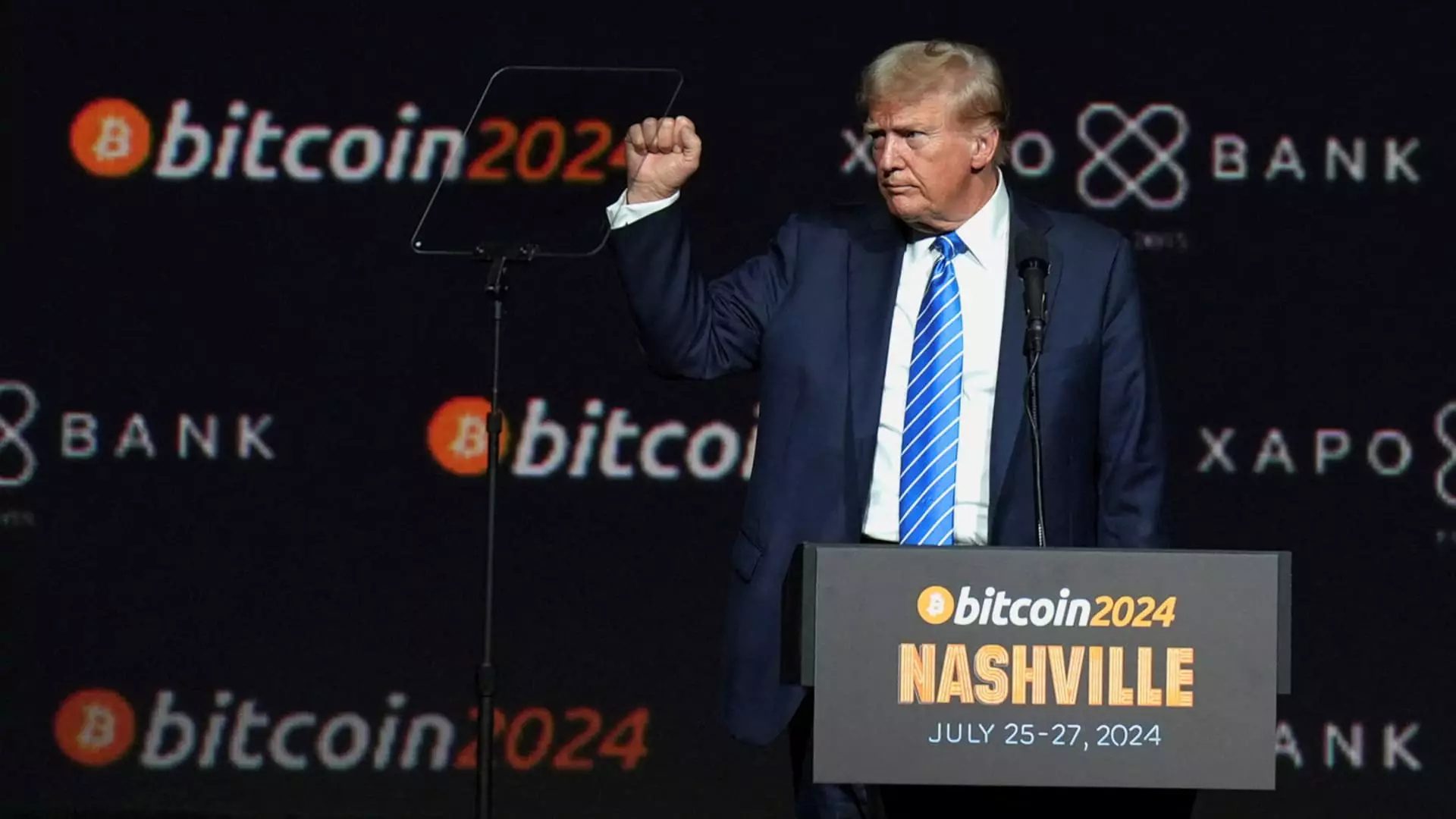In a move that sent shockwaves through the financial and tech sectors, Trump Media recently announced a staggering $2.5 billion fundraising initiative aimed at establishing one of the largest bitcoin treasury allocations by any public company. This strategic pivot from merely a social media platform promoting free speech to a formidable player in the financial services arena marks a revolutionary milestone. Despite the sizable investment from institutional investors, it’s worth noting that the market responded with skepticism, pushing the company’s shares down nearly 10% in the immediate aftermath of the announcement.
President Trump’s venture is more than just capital allocation; it signals aspirations to meld the realms of technology, finance, and politics into a cohesive strategy that resonates with the right-leaning user base. With a commitment of $1.5 billion in common stock and another $1 billion in convertible notes, Trump Media is not just buying into cryptocurrency but is establishing bitcoin as a foundational asset within its treasury—a bold and potentially game-changing decision for the company and the crypto sphere.
The Bitcoin Strategy and Its Implications
Holdings of bitcoin as a treasury asset are not merely about capital appreciation; Devin Nunes, CEO of Trump Media, referred to this strategy as leveraging bitcoin to combat what he perceives as systemic financial discrimination against conservative enterprises. This adversarial narrative paints a picture of a company fighting back against the financial system, setting a tone that strongly resonates with their target demographic.
Anchorage Digital and Crypto.com will manage the bitcoin reserves, reaffirming Trump’s commitment to leveraging established platforms in the crypto space. Being at the forefront of such financial maneuvers aligns Trump Media with a growing ethos among politically active businesses converting corporate treasuries into bitcoin-heavy vehicles. This notion echoes the earlier strategies set forth by companies like MicroStrategy, which first captured attention with major bitcoin acquisitions back in 2020, but now finds additional vigor within Trump’s political movement, which appears to be rallying support amongst those disillusioned with traditional financial institutions.
The timing of the announcement could not be more poignant, coinciding with Bitcoin 2025, one of the largest gatherings for cryptocurrency enthusiasts. The presence of multiple Trump family members and high-profile officials during this pivotal event signifies a concerted effort to not only engage with the crypto community but also to solidify Trump’s persona as “the crypto president.” This blending of politics and finance can galvanize support while galvanizing his base’s belief in financial empowerment through cryptocurrency.
Institutional Reception and Market Reactions
Despite the high-profile nature of the announcement, the immediate market reaction—proof of a 30% decline in stock this year—raises flags about investor confidence. It begs the question: can Trump Media pivot into a sustainable financial services entity in an already competitive market, particularly when operating against a backdrop of considerable losses? With revenues reported at just $3.6 million against a staggering $400 million loss for 2024, the financial health of Trump Media remains in precarious waters.
Ultimately, the skepticism isn’t merely about the financials but extends to broader implications—the risks associated with a company led by a polarizing figure and the potential fallout from further regulatory scrutiny of the cryptocurrency marketplace. The elevation of Trump into the crypto-ecosystem might excite supporters, but it also risks deeper scrutiny from regulatory bodies vigilant about enforcing compliance and fostering market stability.
The Crypto Landscape: A Battlefield for Ideologies
Trump Media’s foray into bitcoin is symptomatic of a larger battle, where financial institutions and political ideologies collide. While he presents bitcoin as an “apex instrument of financial freedom,” the current bifurcation of beliefs among financial institutions complicates the narrative. The very essence of cryptocurrencies as decentralized, free-market tools stands in juxtaposition with the pretentiousness projected by major banks, criticized for their perceived exclusion of conservative clients.
As Trump Media continues to carve its niche, it raises questions about the pathways available for crypto adoption amidst ongoing regulatory scrutiny. Partnerships with platforms like Crypto.com for facilitating exchange-traded funds offer promising avenues for Trump Media, potentially placing bitcoin products directly into the hands of investors. The intention to brand and promote these products globally could democratize access to digital assets, aligning with an ethos of financial independence.
The growing intertwining of crypto and politics, propelled by a charismatic yet controversial figure like Trump, could either invigorate the sector or establish a precarious precedent. While the business strategy may indeed act as a shield for perceived financial discrimination, it simultaneously redefines the cryptocurrency narrative, positioning it within the annals of a politically charged environment fraught with both opportunity and risk.
As Trump Media positions itself at this intersection—seeking to harness the transformative potential of bitcoin while navigating the volatile realities of the marketplace—the outcome will inevitably shape not just the perception of cryptocurrencies within conservative circles, but also the overall landscape of financial services in America.


Leave a Reply